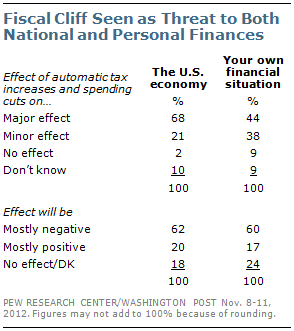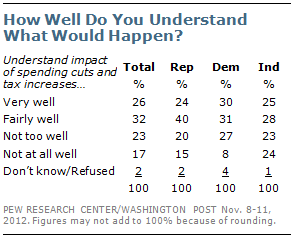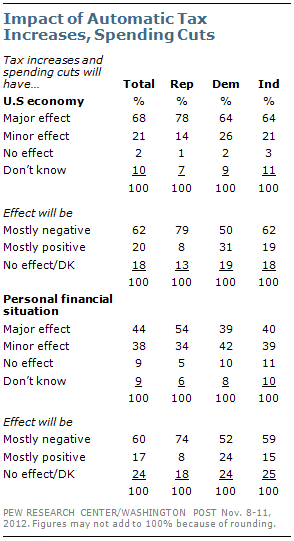Overview

As the president and congressional leaders begin negotiations to avoid the “fiscal cliff” deadline at the end of the year, there is widespread public concern about the possible financial consequences. More say the automatic spending cuts and tax increases scheduled to take effect in January would have a major effect on the U.S. economy than on their own finances. But nearly identical majorities say the effect of the changes would be mostly negative for the economy (62%) and their personal financial situation (60%).
The public is skeptical that President Obama and congressional Republicans will reach an agreement by the end of the year to avoid the fiscal cliff. About half (51%) say the two sides will not reach an agreement, while just 38% say they will. If no deal is reached, more say that congressional Republicans would be more to

blame than President Obama (53% vs. 29%).
The latest national survey by the Pew Research Center for the People & the Press and The Washington Post, conducted Nov. 8-11, 2012, among 1,000 adults finds sharp partisan divisions over prospects for a deal to avoid the fiscal measures from automatically taking effect.
Republicans are particularly skeptical: By a 66%-25% margin more think an agreement will not be reached. By comparison, Democrats are about as likely to expect a deal to be made (47%), as not (40%). Among independents, 51% do not think President Obama and Republicans and in Congress will come to an agreement, while 37% think this will happen.
If an agreement is not reached, 85% of Democrats and 53% of independents say that Republicans in Congress would be more to blame. About two-thirds of Republicans (68%) say that if an agreement is not reached, President Obama would be more to blame.
Impressions of Fiscal Cliff
While debate over the fiscal cliff is the dominant issue in Washington, many Americans say they do not fully understand the consequences of the tax and spending measures taking effect. Only about quarter (26%) say they understand very well what would happen if the automatic spending cuts and tax

increases were to go into effect in January; 32% say they understand the effect of these changes fairly well. About four-in-ten (42%) say they understand the impact of these measures not too well (23%) or not at all well (17%).
There are only slight partisan differences in percentages saying they understand the consequences of the fiscal cliff: 64% of Republicans and 61% of Democrats say they understand the possible impact of the spending and tax changes. That compares with 53% of independents.
Those who say they understand the potential impact of the automatic spending cuts and tax increases either very or fairly well are more likely to say there will be a major impact on the U.S. economy (75%) and their own personal finances (48%) than are those who understand the issue not too well or not at all well (58% major impact on economy, 38% major impact on personal finances).
The election is the public’s top news story this week: Fully 60% say they followed news about the

presidential election very closely. That is the same as the percentage tracking election news during the week that Obama was elected president four years ago (60%).
Nearly half (46%) followed news about the impact of Hurricane Sandy very closely, down slightly from 53% a week prior.
Interest in news about the fiscal cliff nearly equals interest in news about the economy. Nearly four-in-ten (38%) followed news about the debate in Washington over the possible spending cuts and tax increases very closely; 41% paid very close attention to economic news. In July, just 23% followed news about the possible tax and spending changes very closely.

Partisan Divide in Views of Fiscal Cliff
Republicans and Democrats take somewhat different views on the effect automatic spending cuts and tax increases would have on the economy and their own personal finances.
Republicans are more likely than Democrats to say there would be a major effect on the economy (78% vs. 64%) as well as on their own personal finances (54% vs. 39%).
In addition, 79% of Republicans say the effect on the economy would be negative and 74% see a negative impact on their own personal finances. By comparison, Democrats express less concern: 50% say the economic effect of automatic spending cuts and tax increases would be mostly negative, and 52% say the same about the effect on their personal finances.




